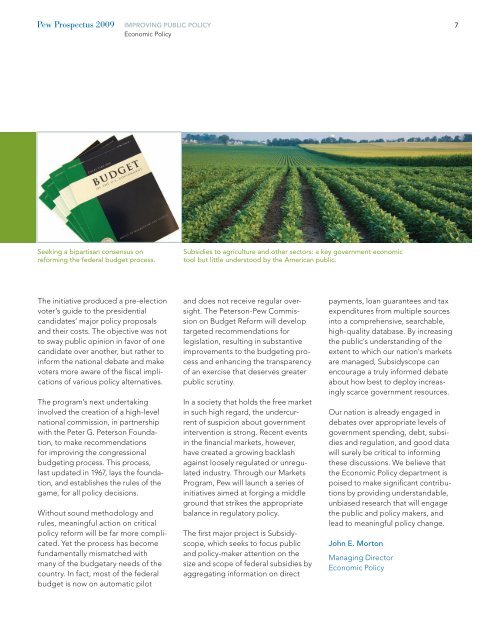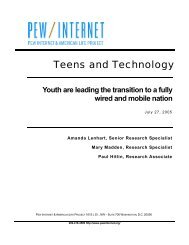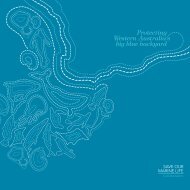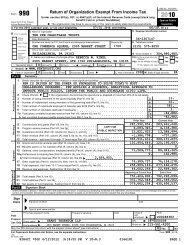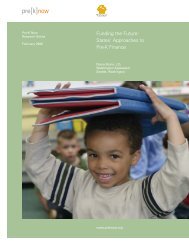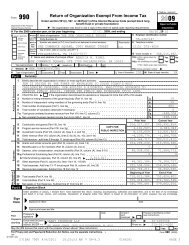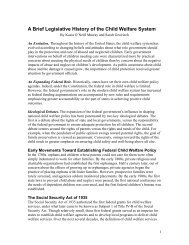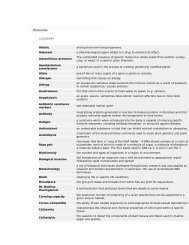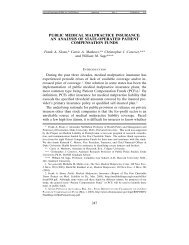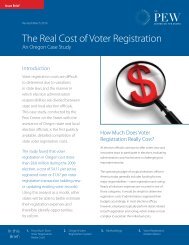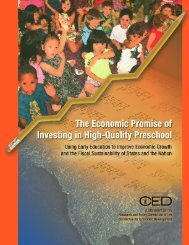PROSPECTUS - The Pew Charitable Trusts
PROSPECTUS - The Pew Charitable Trusts
PROSPECTUS - The Pew Charitable Trusts
Create successful ePaper yourself
Turn your PDF publications into a flip-book with our unique Google optimized e-Paper software.
<strong>Pew</strong> Prospectus 2009<br />
IMPROVING PUBLIC POLICY<br />
Economic Policy<br />
7<br />
Seeking a bipartisan consensus on<br />
reforming the federal budget process.<br />
Subsidies to agriculture and other sectors: a key government economic<br />
tool but little understood by the American public.<br />
<strong>The</strong> initiative produced a pre-election<br />
voter’s guide to the presidential<br />
candidates’ major policy proposals<br />
and their costs. <strong>The</strong> objective was not<br />
to sway public opinion in favor of one<br />
candidate over another, but rather to<br />
inform the national debate and make<br />
voters more aware of the fiscal implications<br />
of various policy alternatives.<br />
<strong>The</strong> program’s next undertaking<br />
involved the creation of a high-level<br />
national commission, in partnership<br />
with the Peter G. Peterson Foundation,<br />
to make recommendations<br />
for improving the congressional<br />
budgeting process. This process,<br />
last updated in 1967, lays the foundation,<br />
and establishes the rules of the<br />
game, for all policy decisions.<br />
Without sound methodology and<br />
rules, meaningful action on critical<br />
policy reform will be far more complicated.<br />
Yet the process has become<br />
fundamentally mismatched with<br />
many of the budgetary needs of the<br />
country. In fact, most of the federal<br />
budget is now on automatic pilot<br />
and does not receive regular oversight.<br />
<strong>The</strong> Peterson-<strong>Pew</strong> Commission<br />
on Budget Reform will develop<br />
targeted recommendations for<br />
legislation, resulting in substantive<br />
improvements to the budgeting process<br />
and enhancing the transparency<br />
of an exercise that deserves greater<br />
public scrutiny.<br />
In a society that holds the free market<br />
in such high regard, the undercurrent<br />
of suspicion about government<br />
intervention is strong. Recent events<br />
in the financial markets, however,<br />
have created a growing backlash<br />
against loosely regulated or unregulated<br />
industry. Through our Markets<br />
Program, <strong>Pew</strong> will launch a series of<br />
initiatives aimed at forging a middle<br />
ground that strikes the appropriate<br />
balance in regulatory policy.<br />
<strong>The</strong> first major project is Subsidyscope,<br />
which seeks to focus public<br />
and policy-maker attention on the<br />
size and scope of federal subsidies by<br />
aggregating information on direct<br />
payments, loan guarantees and tax<br />
expenditures from multiple sources<br />
into a comprehensive, searchable,<br />
high-quality database. By increasing<br />
the public’s understanding of the<br />
extent to which our nation’s markets<br />
are managed, Subsidyscope can<br />
encourage a truly informed debate<br />
about how best to deploy increasingly<br />
scarce government resources.<br />
Our nation is already engaged in<br />
debates over appropriate levels of<br />
government spending, debt, subsidies<br />
and regulation, and good data<br />
will surely be critical to informing<br />
these discussions. We believe that<br />
the Economic Policy department is<br />
poised to make significant contributions<br />
by providing understandable,<br />
unbiased research that will engage<br />
the public and policy makers, and<br />
lead to meaningful policy change.<br />
John E. Morton<br />
Managing Director<br />
Economic Policy


